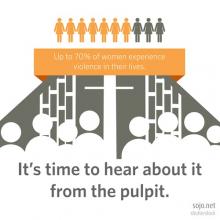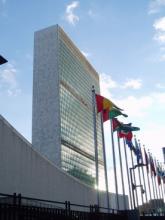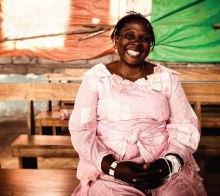rape

When I first read about the rape of Tamar, I was astonished. This tragic story of a beautiful princess — sexually violated by her half-brother and then betrayed by her powerful father — left me aghast. What could I do with this troubling tale, tucked among pages of scripture where I sought spiritual guidance?
Throughout my life in the church, I had never heard the name “Tamar.” No reference to this daughter of King David. No remembrance of her profound suffering and grief.
It’s not an easy story to hear, especially within the biblical narrative of God’s love and providential care for God’s people. It’s like a well-guarded family secret no one dares mention, as if it might swell into a crushing typhoon, leaving devastation in its wake. Following tradition, I hoped not to encounter Tamar’s story again.
If shunning the ancient biblical story of Tamar is all too easy, avoiding news of unrelenting violence against women is becoming harder.

During my freshman year of college, a girl who lived in my dorm was raped. It was during the first month of school. I didn’t know her well. As the rumors spread, I remember thinking, “Oh yeah, the blonde with the big boobs.”
I remember having a conversation with my friend about how nice the accused boy seemed. I remember that friend replying, “She did wear low cut shirts during orientation — makes sense she would start a rumor like that.”
The survivor transferred from my college the following semester.
During my senior year of college, my best friend was the president of his fraternity. During the fall semester, there was a reported case of rape that occurred with two males and one female in the basement during a party. All I remember is how stressed my friend was because, as president, he had to deal with the legal proceedings of the case. The case was closed without either of the men being prosecuted. I remember being upset because my favorite fraternity was put on probation (no parties on the weekend) for two months. I never knew the survivor.
The documentary The Hunting Ground taught me I was part of campus rape culture, and I didn’t even realize it. It is estimated that between 20 percent and 25 percent of women experience completed or attempted rape over the course of a college career. That means for every 1,000 women attending a college or university, there are 35 incidents of rape each academic year.

Silverman makes a startling pronouncement: “We should have more rape jokes,” she says.
And if they're donw within the right framework, she’s totally right. Though rape jokes have traditionally been made at the expense of victims or used to normalize rape (for example, Daniel Tosh’s stand-up routine in which he imagines a rape victim laughing while being attacked), Silverman recognizes that humor can be a powerful tool for dismantling rape culture.
Silverman recently demonstrated the power of jokes aimed at rape culture when a recent photo she posted on Twitter went viral. The photo captured a list of “Rape Prevention Tips” for potential rapists. The list included lines like: “Carry a rape whistle. If you find you are about to rape someone, blow the whistle until someone comes to stop you.”
Of course, what makes this photo powerful is how it challenges the dangerous idea that the best way to prevent rape is to teach individuals to avoid getting raped; as Lyndsey Christofferson explains in “Blaming the Victim” (Sojourners, May 2015) this idea has weaseled its way into how Christians interpret biblical passages about sexual assault (Bathsheba, anyone?) as well as how we teach young people about modesty. Instead, Silverman’s photo points out that the best way to avoid rape is to teach people not to be rapists.
1. ‘A Rape on Campus:’ What Went Wrong?
Columbia University’s Journalism school released its report detailing the journalistic failures of Rolling Stone’s viral story ‘A Rape on Campus,’ which initiated, and later may have stifled, an honest conversation about the prevalence rape on college campuses. Read the full report. “[Writer Sabrina Rubin] Erdely and her editors had hoped their investigation would sound an alarm about campus sexual assault and would challenge Virginia and other universities to do better. Instead, the magazine's failure may have spread the idea that many women invent rape allegations.”
2. The Courage of Bystanders Who Press ‘Record’
“Despite the fact that the world can now see Eric Garner being killed by an illegal chokehold — despite the fact that New York City Police Department banned chokeholds years ago — film of the incident did not result in the officer, Daniel Pantaleo, being charged. But thanks to the efforts of Ramsey Orta, who filmed Garner’s death, we know.”
3. Hope but Verify: The Iran Nuclear Framework
“House Speaker John Boehner recently said this about the broader instability in the Middle East: 'The world is starving for American leadership. But America has an anti-war president.' In the context of our faith — or even in the context of conservative ideals — is leadership that prevents war something to be maligned?”
4. How the Presidential Candidates Found Their Faith
“This season’s crop of presidential candidates reflects this country’s many contradictions in faith.” Newsweek explores the faith backgrounds of the apparent 2016 field so far.

Living in a different time zone, I was not able to watch the live coverage of the Golden Globes, but I turned to the next best thing: Twitter. It didn’t take long before the newsfeed sounded out a collective gasp from Tina Fey and Amy Poehler’s Bill Cosby rape joke:
“Sleeping Beauty just thought she was getting coffee with Bill Cosby.”
Some may have thought the joke too offensive, that rape is too serious a subject to use as speech fodder, but I found it genius. Fey/Poehler called out the offense of a powerful man in his own arena, the world of entertainment where he gained his prestige, against the women he allegedly assaulted. They brought a buried injustice up to the surface, making the rich and glamorous squirm with discomfort — is that not the work of modern-day prophetesses? The fact that it came from two women who know first hand the misogyny in the male-dominated industry of comedy added another layer of irony and punch to the boundary-stretching joke. Tina Fey and Amy Poehler, women who are smart, talented, and gutsy enough to call out injustice, make me proud to be a woman. They are my people.
This past weekend, I’ve been following another event: the annual Gay Christian Network Conference in Portland. I take seriously my charge to find beauty in the margins. And whatever your stance is on the LGBT Christian debate, the fact that mainstream Christian media was conspicuously silent on covering the GCN conference is proof that within evangelicalism, gay Christians still live at the margins.

In the beginning, there was “Noah.”
Coming up, there’s “Exodus: Gods and Kings,” an update of Cecil B. DeMille’s classic for this generation.
And that’s not all. On Dec. 7, Lifetime’s miniseries “The Red Tent” premieres.
God is smiling on Hollywood.
The adaptation of Anita Diamant’s blockbuster novel (and perennial reading group favorite) is an expansion and interpretation of the story of Dinah from the book of Genesis.
I have not seen “The Red Tent,” though I have read Diamant’s book. But its airing could not be more timely — the same week as Jewish congregations are reading the story of Dinah from the Torah.
There is something else that makes “The Red Tent” timely — tragically timely, in fact.

It was 2006’s “The God Delusion” that many credit with sparking a growing interest in atheism in the U.S. Along with best-selling books by the other members of the “Four Horsemen” of atheism—the late Christopher Hitchens, Sam Harris, and Daniel Dennett—Dawkins’ rising star mirrored the growth of atheism in the last decade.
In 2012, the Pew Research Center found 5.7 percent of Americans identified as either atheists or agnostics, up from 3.7 percent in 2007.
“Richard Dawkins has done a lot to bring atheism to a whole new generation,” said Phil Zuckerman, a sociology professor who studies atheism and who also credits Dawkins with speaking out against the pedophilia scandal within the Catholic Church. “On the other hand, Dawkins seems to embody everything that people dislike about atheists: He is smug, condescending and emits an unpleasant disdainfulness. He doesn’t ever seem to acknowledge the good aspects of religion, only the bad. In that sense, I think he doesn’t help atheism in the PR department.”
One of Dawkins’ biggest missteps came in 2011, when he blasted Rebecca Watson, a young atheist activist who wrote about feeling sexually harassed at a freethought conference. In a now infamous series of comments posted to the blog Pharyngula, Dawkins wrote in a message titled “Dear Muslima,” “Stop whining, will you? ... For goodness sake grow up, or at least grow a thicker skin.”

Despite tougher laws against sexual violence, the grisly rape and murder of two teenage girls found hanging from a tree shows India has a long way to go to safeguard women in its male-dominated, socially stratified culture, critics say.
The incident in Katra Sadatganj, an impoverished village in the north Indian state of Uttar Pradesh, is just the latest in a string of attacks. At least two other rape cases were reported in the past two weeks in the same state. The incidents are igniting debate about sexual violence against women and triggering outrage over lax attitudes about it, despite the strengthening of laws against rape last year.
In his opinon column published on June 6, George Will suggests that colleges have "become the victims of progressivism," blaming a proliferation of victims on government overreach. In his first paragraph, Will disregards the validity of sexual assult on campuses, as he says:
[Colleges and universities] are learning that when they say campus victimizations are ubiquitous (“micro-aggressions,” often not discernible to the untutored eye, are everywhere), and that when they make victimhood a coveted status that confers privileges, victims proliferate. And academia’s progressivism has rendered it intellectually defenseless now that progressivism’s achievement, the regulatory state, has decided it is academia’s turn to be broken to government’s saddle.
In response to his article, survivors have taken to Twiter with #SurvivorPrivilege.
#SurvivorPrivilege pic.twitter.com/zNFggXGT64
— Elizabeth Plank (@feministabulous) June 9, 2014
To my fellow men,
I’m sure you are as heartbroken as I am about the killings at UC Santa Barbara by a troubled young man with a misogynistic manifesto. Heartbroken for the community, for the families who lost loved ones, and even for the young man who felt like there was no other way.
Now I’m not much of a “Tweeter” (is that the right word?), but I heard that a group of us has taken to defending ourselves on Twitter with the hashtag #NotAllMen. They want to say that that #NotAllMen sexually assault women. #NotAllMen expect a date to be reciprocated with sex. #NotAllMen harass women for the way they do or don’t look at us. They want to say that we’re not like those other people, that we respect women as equals, not demean them as prizes or products.
Who cares?
Today Vice President Joe Biden announced a series of new initiatives aimed at addressing sexual violence on college campuses and launched NotAlone.gov — a website that pools campus reporting data and points both students and school officials to sexual assault resources.
The administration is also releasing the first report of the White House Task Force to Protect Students from Sexual Assault, which was established in January.
Under Title IX, college campuses that receive federal funding are already required to take steps to prevent sexual assault on campus and respond promptly when sexual assault is reported. Further, the Clery Act requires those that receive funding to report their crime statistics and provide policies for prevention. The website NotAlone.gov will be a central repository for these reports and clarify for students their rights under the Clery Act and Title IX.
What is unclear, however, is what has changed for Christian college campuses and other private institutions.
Too many women and men are sexually assaulted in college. We must put an end to this violence. → http://t.co/9QH89qCLvd #1is2Many
— Office of VP Biden (@VP) April 29, 2014Pink princess pajamas. Jeans and a t-shirt. Sweatpants and a baggy sweater.
When Twitter user Christina Fox (@Steenfox) asked her followers, “What were you wearing when you were assaulted?” some answered with these clothes.
Fox prompted the question after reading a story about a 60-year-old woman who was raped by her grandson.

Christian men - males who are caught up in the ancient, raw, and radical Jesus movement, this is to you:
It's high time we say something, do something - good Christian men, stand up. Women are being raped and sexually abused across the world, and we continue to theologically shrug our shoulders. It's just the way it is, we say.
Whether we want to admit it or not, we turn a blind eye to the ways in which our holy scriptures have sanctioned this throughout history.

Tomorrow is Valentine’s Day, our annual reminder to celebrate the love we share in our lives. While many may be struggling through aisles of candy hearts and bunches of roses, I invite you to flip this day of mandatory public expressions of love on its head.
What if, along with romantic dinners and expensive chocolates, we celebrated those we love by committing ourselves against sexual and domestic violence? This Valentine’s Day, or V-Day, Sojourners is joining with One Billion Rising to speak out on violence against women — the most hidden injustice in our world. We speak out because one in three women will be raped or beaten in their lifetime. That’s one in three women in my family, in my circle of friends, in my workplace — and in my church.
We speak out because we want a different reality for our daughters.
We speak out because our Christian faith tells us to lift up the voices others would silence.
And we speak out because we must rally our church leaders to commit themselves to do the same.

Sojourners is offering an important opportunity for Christian churches to examine their attitudes towards women. Following up on an article by Michelle A. Gonzalez entitled “Breaking the Habits of Machismo,” Gonzalez and Jim Wallis, president of Sojourners, will conduct a live video discussion on Wednesday, Feb. 12 to “discuss what the Bible really says to encourage, affirm, and empower women and girls in their call to be leaders.”
Judging from Gonzalez’s article, this conversation will focus on what it means to affirm that both men and women are created in God’s image. She begins her article with the Common English Bible translation of Genesis 1:27: “God created humanity in God’s own image, in the divine image God created them, male and female God created them.” Though she points to important changes taking place in Christianity today, Gonzalez traces the legacy of Christian thinking on womanhood that has elevated men and devalued women, instilling “habits of machismo” in our churches and our culture that are difficult to break.
But break them we must, Gonzalez argues, if we want to free both our theology and our practice from “male-oriented power structures.” Amen, sister. Because this is about more than equal employment opportunities for women in church administrative structures, of whether we are allowed to “preach, lead from the altar, celebrate communion, administer rites, pastor congregations, or teach.” What’s at stake in this conversation is whether Christians — and I think this is a call to American Christians in particular — whether American Christians are willing to dismantle a long-held justification for violence against women, not just in our country, but around the world. Gonzalez herself points out that patriarchal “attitudes can lead to greater violence against women, such as we see in the increasing exploitation and attacks on young women and how social media is used to perpetuate and document these horrific acts,” but this is her only nod to the issue of gender-based violence. Let’s add to the picture a look at the violence perpetrated by men against female bodies that has become to typify conflict zones around the world.

A United Nations panel on Wednesday blasted the Vatican for protecting itself rather than victims of sexual abuse, and it called on the Holy See to create what it called an “independent mechanism” to investigate new charges of abuse.
The 16-page report from the Committee on the Rights of the Child accused the Vatican of “systematically” adopting policies that allowed priests to rape and molest thousands of young people over a span of decades. It also calls on the church to remove known or suspected abusers from its ranks immediately.
“The Committee is gravely concerned that the Holy See has not acknowledged the extent of the crimes committed, has not taken the necessary measures to address cases of child sexual abuse and to protect children, and has adopted policies and practices which have led to the continuation of the abuse by and the impunity of the perpetrators,” the report said.

Chiamaka tells of women who plant seeds
of peace in tribal towns, pot-banging with spoons
to call men off their game of raid-and-rape.
A girl named Hope intercepts the hands
of crowing children trading blows
and coaxes them to shake their hands
although her own are quaking. At school
my shy daughter stuffs notes in friends’ lockers,
imploring playground harmony.

A FEW YEARS ago in this column, I told the story of Charlene, a woman I had just met in a camp for displaced people in the Democratic Republic of Congo. Charlene’s civilian husband had been murdered by rebel fighters in Congo’s brutal civil war. She and her eight children then fled for their lives, ultimately finding shelter in the hovel of mud and sticks where I met them (September-October 2010).
Like thousands of other displaced Congolese women, Charlene had been forced by destitution to hike into the forest for firewood to trade for food for her children. Like thousands of other displaced Congolese women, Charlene had been brutalized by fighters who hid in the forests and used rape as a weapon of war. Like thousands of other displaced Congolese women, Charlene had been impregnated by her rapist. Because of the stigma of rape in that culture, the beautiful two-week-old baby she’d named David was destined to a life of marginalization and despair.
Charlene was the first woman I met in Congo. She explained to me that even when the women went to the forest in groups, armed rebels would overpower and rape them. If husbands went into the forest to protect their wives, the rebels would kill the husbands, and then rape the wives. The women took the risk—and paid the price.
For me, Charlene gave human shape to Congo’s horrific story of colonial exploitation, tribal conflict, and foreign greed. In the four years after we met, hers was the first story I told whenever I spoke about Congo. It was her pain that motivated me to keep speaking, writing, and advocating for Congo.

Sexual and gender-based violence (SGBV) is a public health emergency devastating its victims and their families physically, emotionally, mentally and spiritually. Sexual violence is a horrific act that the perpetrator forgets, but the survivor does not, with the consequences continuing – from the posttraumatic stress, to compromised health to the lower survival rates of her children. And these crimes are not just occurring in areas of war and civil unrest. Rather, they are a part of deeply ingrained behavior in all levels society the entire world over. This year, the World Health Organization reported that 1 in 3 women globally will experience SGBV in her lifetime. Studies in the United States produced similar findings.
Rape is a war crime and can be an act of genocide. Yet we often do not respond adequately to it as a global society. For example, in my country, women impregnated by rape may pass HIV to their babies. Children born from rape may also suffer community rejection because of the atrocities of their conception. SGBV programs must take this dynamic into account.
SGBV requires a holistic response that does not forget the indirect victims of rape, the spouses and children of the victims and the community at large. We must remember that rape tears at the social fabric of communities because victims and their families often “lose” themselves. This is why the faith community is so important to this effort.
The faith community is a powerful agent of social change and possesses a founding principle of love and spirituality as well as the power and influence to lead individuals and communities to respond appropriately and effectively to SGBV. Faith leaders and their communities have immense power to reach all levels of society as well as a proven track record of leadership on such issues as poverty alleviation, HIV/AIDS and malaria.
Yet despite sexual violence’s being endemic the world over, leaving massive destruction in its wake, the faith community has remained virtually silent on this issue and sometimes has even perpetuated the stigma and discrimination of SGBV survivors.

By official estimates, 26,000 people are sexually assaulted in the U.S. military each year. That comes out to 71 people every day. It’s an epidemic that’s been widely reported in the news.
As if that weren’t bad enough, most of the assaults go unreported – only 11 percent of assault victims ended up filing reports last year (3,374). Studies show that those who do not report the assault cite fears of retaliation and a concern that nothing will be done.
Leaders in Congress are trying to change that this week with the Military Justice Improvement Act.
Right now, if a woman is sexually assaulted in the military, her case is evaluated by a commanding officer. This officer decides whether to bring the case to trial. Once it has been tried, the same commanding officer is responsible for enforcing the consequences. That’s called “convening authority.”